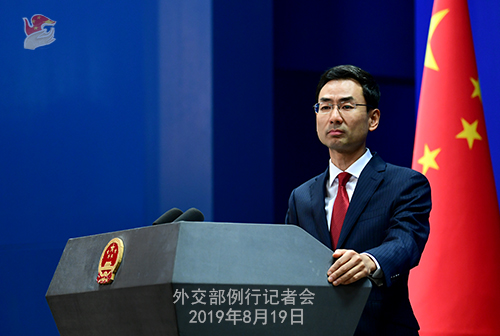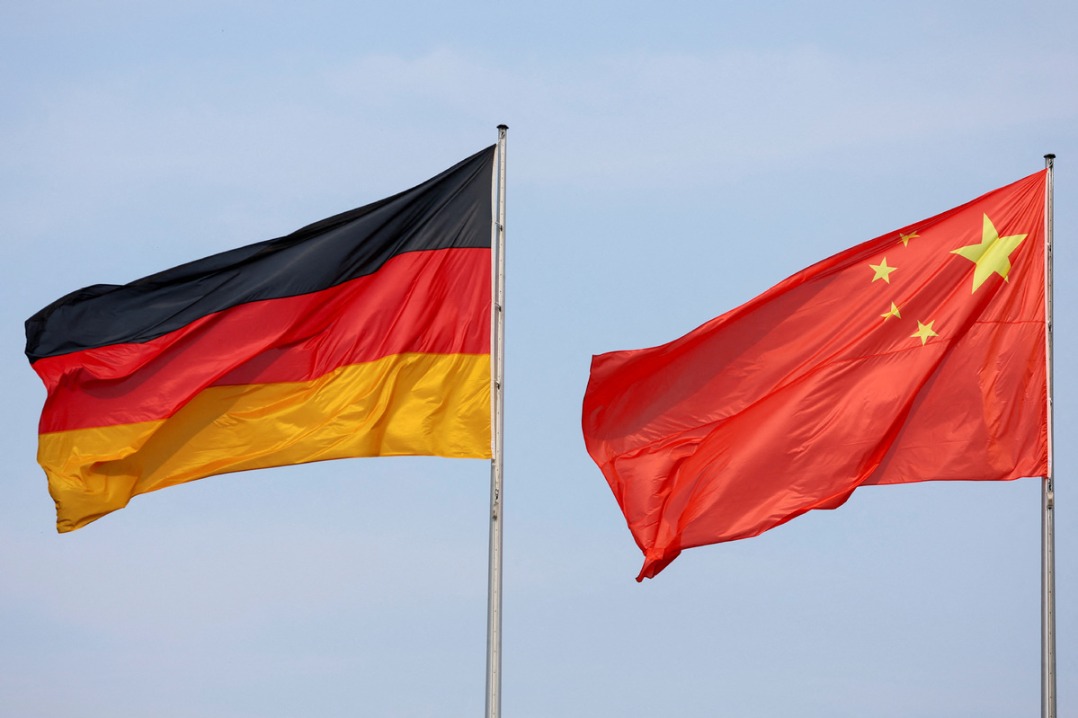Foreign Ministry Spokesperson Geng Shuang's Regular Press Conference on August 19, 2019


Q: The China-Japan-ROK Foreign Ministers' Meeting will soon be held in Beijing. Can you share with us what will be discussed and what are China's expectations?
A: The ninth China-Japan-ROK Foreign Ministers' Meeting will be held on August 21 in Beijing. State Councilor and Foreign Minister Wang Yi will chair it. The ROK Foreign Minister Kang Kyung-wha and Japanese Foreign Minister Taro Kono will attend it. The three foreign ministers will exchange views on China-Japan-ROK cooperation, the preparation of the eighth China-Japan-ROK Leaders' Meeting and regional and international issues of mutual interest. There will also be sideline bilateral meetings.
This meeting is an important one as we're celebrating the 20th anniversary of China-Japan-ROK trilateral cooperation. Through this meeting, China hopes to have extensive and in-depth exchange of views with the ROK and Japan, deepen practical cooperation across the board, plan for future trilateral cooperation, jointly safeguard regional peace and stability, and make good preparations for the eighth China-Japan-ROK Leaders' Meeting.
Q: There have been clashes in Canada, Australia and other countries between supporters of the Hong Kong protesters and supporters of the Hong Kong police. What is the foreign ministry's opinion of overseas students and other overseas Chinese citizens participating in these pro-Beijing counter-protests?
A: We noted the media reports. First, it is totally understandable and reasonable for Chinese students and other Chinese citizens overseas to express indignation and opposition against such words and deeds that attempt to separate China and smear its image.
Second, we also hope overseas Chinese can express their patriotism in a rational way and protect themselves from harm.
Third, the Chinese government asks overseas Chinese to observe local laws and regulations. In the meantime, we hope relevant countries can understand and respect their legal activities and protect their lawful rights and interests.
Q: President Trump said over the weekend that he doesn't want to do business with Huawei and that he isn't ready for a trade deal with China. Do you think it makes sense for China to continue negotiations with the US under these conditions?
A: Regarding Huawei, like we said many times, the economic and trade cooperation between Chinese and American companies is mutually beneficial. During the meeting between the two presidents in Osaka, the US side said it would allow US companies to continue to supply Huawei. When and how the US will honor its words concerns its credibility and reputation. The world is watching. We hope the US will honor its commitment, stop unreasonably oppressing and sanctioning Chinese enterprises, treat them in a fair, just and non-discriminatory manner and do more to advance the healthy and steady development of China-US trade.
As to the trade talks, China's position is consistent and clear. We hope the US will work with China to implement the consensus between the two leaders reached at the Osaka meeting, and find a solution acceptable to both sides through dialogue and consultation on the basis of equality and mutual respect.
You may have also noted that the negotiating teams of both sides have maintained contact with each other. Last Tuesday, Vice Premier Liu He had a telephone call with his US counterpart for the China-US high-level economic and trade consultation and the press release is readily available.
Q: Recently three ethnic armed groups in northern Myanmar attacked multiple targets in areas controlled by the army, which caused casualties. What's your comment?
A: The armed attacks caused casualties and disturbed peace and stability in northern Myanmar. China is firmly against it. We attach high importance to peace and tranquility at the China-Myanmar border and firmly support the peace process in Myanmar. The ceasefire and peaceful situation in northern Myanmar should be maintained. China has played a constructive role in this and will continue to do so.
Q: In response to reports that the Chinese scientific researchship Haiyang Dizhi 8 and coast guard vessels returned to Vietnam's exclusive economic zone, the spokesperson of Vietnamese foreign ministry said on August 16 that Vietnam has made serious protest to China and demanded that China withdraw the vessel group from Vietnamese waters. Vietnamese authorities would continue to take measures to exercise sovereignty and jurisdiction in accordance with Vietnamese law and international law. What's your comment?
A: China has sovereignty over the Nansha Islands and its adjacent waters and has sovereign rights and jurisdiction over the relevant waters. The relevant Chinese ship was all along operating in waters under China's jurisdiction. During that process, the ship properly adjusted its operation plan in accordance with the maritime conditions and practical needs. We hope the relevant country will earnestly respect China's sovereign rights and jurisdiction and work with China to uphold harmony and tranquility in those waters.
Q: Chinese fighter jets reportedly conducted a simulated attack training in the East China Sea in May, targeting Japanese Self-Defense Forces' frigates. Japan said such action is very dangerous. Can you confirm that action? What's your comment?
A: I'm not aware of what you said and I'd like to refer you to the military.
Q: On August 17, Sudan's Transitional Military Council and the opposition Forces for Freedom and Change signed a constitutional declaration, under which a new transitional authority named the Sovereign Council will be formed to govern the country in the coming 39 months. It will be headed by the military for the first 21 months, and the opposition for the last 18 months. Abdalla Hamdok, a Sudanese economist, was nominated a few days ago by the opposition to be the prime minister of the transitional government. I wonder if China has a comment on this?
A: China welcomes and supports the official signing of the Constitutional Declaration by relevant sides in Sudan. Ambassador Xu Jinghu, Special Representative of the Chinese Government on African Affairs, attended the signing ceremony. China respects Sudan's right to independently choose its own path of national development. We hope the relevant parties in Sudan will act on the consensus in the declaration, ensure a smooth political transition and bring peace, stability and development to the country at an early date.
Q: The US said on Sunday that the government had approved a proposed deal to sell $8 billion worth of F-16V fighter jets to Taiwan. They would officially notify the congress of the deal. I wonder if China has any comment on that?
A: We've seen relevant media reports. China has recently made solemn representations with the US on the planned sales of F-16V fighter jets to Taiwan on many occasions. I shall stress once again that the US arms sales to Taiwan severely violate the one-China principle and the three China-US Joint Communiqués especially the August 17 Communiqué. They constitute severe interference in China's internal affairs and undermine China's sovereignty and security interests. China firmly opposes that.
I must stress that the Taiwan question concerns China's sovereignty, territorial integrity and core interests. China has a firm resolve to uphold its sovereignty and security. China urges the US to fully recognize the highly harmful nature of the arms sales to Taiwan, abide by the one-China principle and the three China-US Joint Communiqués, immediately cancel the planned arms sales, and stop selling weapons and military contact with Taiwan. Otherwise, the US will have to bear all the consequences. China will take necessary measures to safeguard its interests in accordance with the development of the situation.
Q: A report from the United States Studies Center of the University of Sydney said China's growing long-range missile capabilities in the western Pacific pose severe threats to the US and its allies' military bases and facilities in that region. If an armed conflict broke out between Beijing and Washington, China's long-range missiles would likely cripple the United States with lethal precision within hours. It also advised the US and its allies to strengthen their military preparedness. What's your response and comment on that report?
A: When was this report released?
Journalist: Today.
A: I'm not aware of the specifics you mentioned and may need to check on that. If you are interested, you may ask the military. What I can tell you is that China unswervingly follows the path of peaceful development and a national defense policy that is defensive in nature.
Q: US President Trump said that he hopes the issue in Hong Kong will be resolved very humanely. If China resorts to violence, it will affect the trade consultations. How does the central government see the current situation in Hong Kong and the remarks by President Trump?
A: The demonstrations and violent criminal activities in Hong Kong have been going on for more than two months. Hong Kong's rule of law, social order, economic performance, people's welfare, prosperity, stability and international image have all suffered severely. Facts show that the so-called democracy and freedom without rule of law and social order will only lead to anarchy and chaos. At the end of the day, public interests will be damaged. For Hong Kong, the most pressing and overriding task at the moment is to stop violence, end chaos and restore order in accordance with law. The central government will continue its staunch support for the SAR government led by Chief Executive Carrie Lam in governing Hong Kong according to law, for the Hong Kong police in strict and just law-enforcement, and for efforts to bring violent criminals to justice.
Hong Kong affairs are purely China's domestic affairs. We have noted that President Trump said earlier that "Hong Kong is a part of China. They'll have to deal with that themselves. They don't need advice." We hope the US will match its words with deeds.
On how the central government sees the current situation in Hong Kong, I suggest you look at the press release of the seminar on the situation in Hong Kong jointly held by the State Council's Hong Kong and Macao Affairs Office and the Chinese government's liaison office in Hong Kong. The seminar was held on August 7 in Shenzhen. The central government's position and attitude were stated clearly at the seminar.
Regarding the China-US trade consultations, our position is consistent and clear. We hope the US will work together with China to implement the consensus reached by our presidents in Osaka and come up with a mutually-acceptable solution through dialogue and consultation on the basis of mutual respect and equality.
Q: Afghan Interior Ministry spokesperson said that a suicide bomb attack on a wedding hallin Kabulon August 17killed at least 63 people and injured 182. The IS has claimed responsibility. Do you have a comment?
A: China strongly condemns this terrorist attack. We are deeply saddened by the passing of the victims and offer our sincere sympathies to the injured and the bereaved families. China firmly opposes terrorism in all forms. We firmly support the Afghan government and people's efforts to fight terrorism and safeguard national security and stability. We stand ready to work with the international community to help Afghanistan realize peace at an early date.
Q: A follow-up question on the China-Japan-ROK foreign ministers' meeting. Is China planning to raise a question about the possible deployment of the US short- and intermediate-range missiles in the Asia-Pacific region during the talks?
A:The readouts of discussions at the meeting will be released afterwards.
Q: A follow-up question on Hong Kong. About two years ago, the then MFA Spokesperson said that the Sino-British Joint Declaration didn't have a practical significance any more, and was not legally binding for the central government when it comes to its management of Hong Kong. Does the Ministry of Foreign Affairs still have this point of view?
A: As the situation in Hong Kong evolves, we have stated China's position and attitude on the Sino-British Joint Declaration on many occasions since June. Let me briefly reiterate it.
The joint declaration resolved the Hong Kong issue left from history. There isn't any clause in it that entitles foreign forces to interfere in Hong Kong's affairs, which are purely China's internal affairs. The Chinese government exercises jurisdiction over Hong Kong in accordance with the Constitution and the Basic Law of the Hong Kong SAR.
Follow-up: Is China going to honor its commitment in this joint declaration?
A: As we said earlier, with Hong Kong's return to China, the UK's rights and obligations stipulated in the joint declaration were completed. After the handover, China exercises jurisdiction over Hong Kong following China's Constitution and the Basic Law of the Hong Kong SAR.
Q:US Chief Economic Adviser Larry Kudlow said that phone calls over trade negotiations are on-going, and that Chinese trade negotiators are planning a trip to the US in September. Can you confirm that?
A: Actually I already answered a similar question just now.
Regarding the trade consultations, China hopes that the US will work together with us to meet each other halfway and implement the consensus reached by the two presidents in Osaka. It is our hope that we could find a mutually acceptable solution on the basis of equality and mutual respect. The two teams have all along maintained communication. Heads of the two teams just had a telephone call last Tuesday. You may refer to the press release online. As to the specific plans in the next step, I will refer you to the competent authority.
MOST POPULAR
- 1 A look at China's economy in Q1 of 2024
- 2 China to remove foreign ownership restrictions in value-added telecom services in pilot areas
- 3 Query service of A Guide to Working and Living in China as Business Expatriates launched
- 4 Clear negative lists to speed up services trade
- 5 Canton Fair opens in China with surge in overseas purchasers
Editors' Picks
 Infographic:
How to understand China's production capacity
Infographic:
How to understand China's production capacity
 Infographic:
Milestones of China's journey to space
Infographic:
Milestones of China's journey to space
 Infographic:
A look at China's economy in Q1 of 2024
Infographic:
A look at China's economy in Q1 of 2024
 Infographic:
China to remove foreign ownership restrictions in value-added telecom services in pilot areas
Infographic:
China to remove foreign ownership restrictions in value-added telecom services in pilot areas
 Infographic:
2023 Sino-German investment and trade in numbers
Infographic:
2023 Sino-German investment and trade in numbers


